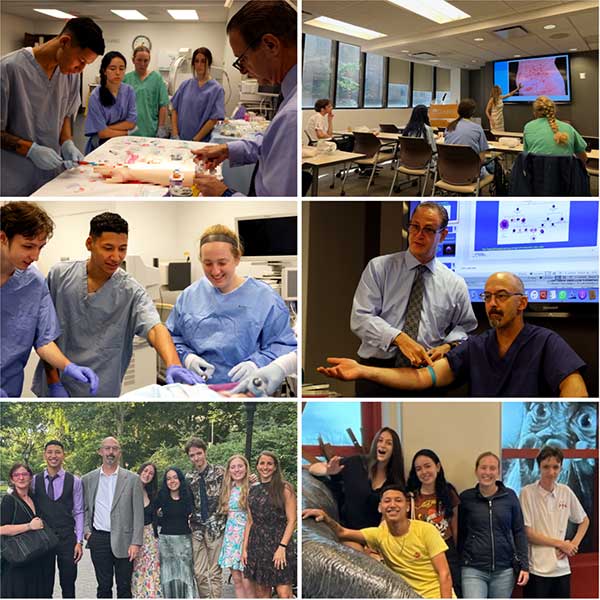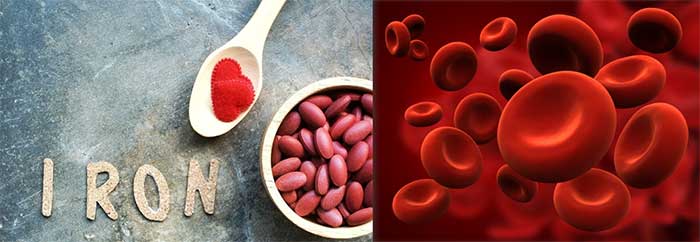Dear Respected Friends, Family and Colleagues,
We hope this Newsletter finds you well and we hope you enjoy!
Announcing the 19th Anniversary Gala – Live and In-Person!

We are excited to announce our first in-person Gala event since 2020! Our 19th Anniversary Gala will be held on Sunday, November 19th, 2023, at Tony’s at the J House, in Greenwich, CT. More details regarding the Gala will follow in the coming months. Please join us in welcoming our first Honorees for this year’s Gala:
Joy Bauer, MS, RDN, CDN – Registered Dietitian-Nutritionist, Nutrition and Healthy Lifestyle Expert on NBC’s TODAY Show, and #1 New York Times Bestselling Author; and Dr. Ryan A. Grant, MD, MBA, FAANS
– Neurosurgeon & Healthcare Entrepreneur, and Founder & CEO of Vori Health.
New Appointees to the Board of Directors
The Foundation is thrilled to officially announce the appointment of two new members to its Board of Directors!
- Mr.RoniH.AmielcomesfromabackgroundinbioinformaticsandiscurrentlytheGroupCEOof Healthcare Leaders Group, serving the fields of ophthalmology, neurology, and orthopaedics.
- Mr. Alex A. Garcia Rodriguez comes from a background in international finance, mergers &
acquisitions, investment, patient relations, and strategic management. Within his healthcare experience, he has worked with NYU’s Hospital for Joint Diseases, Rush University, and the Hospital for Special Surgery.
We are so honored to welcome these driven appointees as they help lead the future of the Foundation!
Manhattan Medical Immersion Camp – Important Updates
Join us for the ultimate, hands-on medical experience!

This year’s Medical Immersion Camp is officially in full swing! We are so excited to be able to offer this program again for 2023, and to be able to continue our mission in inspiring young surgeons across the globe.
The Immersion Camp is a valuable and unique hands-on experience for high school and pre-med students. Due to an unprecedented interest in the program, the deadline to apply with financial aid consideration is now Monday, April 17, 2023; and the deadline to apply without financial aid consideration is now Thursday, April 30, 2023. We are accepting a maximum of 10 students for this prestigious program.
This year’s program will run from July 9th through July 15th, 2023. For more information about the program, to view a video, and access the brochure, visit www.ofals.org/camp. We are so excited to continue to spark imagination and inspire new generations of surgeons and medical professionals!
Research Corner
Options for Patients with Osteoarthritis of the Knee
Knee osteoarthritis (OA) negatively impacts the quality of life of millions of Americans. While total knee replacement is the gold standard operation, patients that have disease isolated to a single compartment of the knee might be eligible for alternative procedures including unicompartmental knee arthroplasty (UKA). Patients with disease and symptoms in the lateral (or outside) compartment of the knee might be eligible for lateral UKA. Our Research Department recently published an article in the Journal of Bone & Joint Surgery evaluating long-term outcomes of lateral UKA in patients with isolated lateral compartment knee OA (view article here). Two-hundred fifty-six patients were followed for up to 17 years after surgery. The team reported that implant survival was 96-100% at 5 and 10 years. Patients achieved excellent functional outcomes with up to 88% of patients achieving high patient satisfaction. Patients reported returning to singles tennis, downhill skiing, and even soccer and hockey. If you have isolated knee pain and OA in the lateral compartment of your knee, you might be an eligible candidate and should consult a physician to discuss potential alternatives to total knee replacement.
If you know someone that is suffering from mild to moderate knee osteoarthritis, contact our research team here to learn more about our clinical trial opportunities to help you Stay in the Game… for Life!
Roundtable Discussion
We recently met with Dr. Clifford Voigt, one of the Foundation’s 2021-2022 Fellows. Dr. Voigt is a Clinical Assistant Professor at SUNY Downstate Health Sciences University’s Department of Orthopaedic Surgery and Attending Surgeon at Harlem Hospital/Columbia University Irving Medical. Many thanks to Dr. Voigt for his valuable contributions to this Newsletter!
Q: Is there a silver bullet that will solve healthcare problems in the United States?
A: As a surgeon, I don’t believe there is one silver bullet solution to solving healthcare problems in the United States. There are a multitude of factors at play including access, affordability, and quality of care. It will take a comprehensive approach involving government policies, private sector innovation, and individual responsibility to make real progress. Any solution will also need to balance the needs of both patients and healthcare providers, including physicians and hospitals.
Q: How do we solve “Emergency Room Healthcare” for the uninsured?
A: Addressing emergency room healthcare for the uninsured is a significant challenge facing our healthcare system. While providing coverage to every individual in the US may not be economically feasible, we need to find ways to ensure that everyone has access to quality care without relying on emergency rooms as a last resort. This may involve expanding Medicaid, increasing funding for community health clinics, providing tax incentives for preventative care or wellness programs, and promoting greater transparency and competition between healthcare providers.
Q: How will hospital systems overcome the staffing shortages to deliver patient care?
A: Staffing shortages are a major concern for hospitals across the country. This is particularly true for surgical specialties, where there is a high demand for skilled physicians and support staff. In order to overcome this challenge, hospital systems will need to develop recruitment and retention strategies that prioritize employee engagement, professional development, and work-life balance. This may also require greater investment in technology and automation to augment the capabilities of care teams, as well as increased collaboration between healthcare organizations to share best practices and resources. Ultimately, the success of these efforts will depend on a shared commitment to creating a culture of excellence in patient care.
Managing Iron Deficiency & Mitigating Anemia

Iron deficiency is one of the most common conditions in the world, affecting about 5% of Americans. Iron deficiency is one of the most common causes of anemia, a condition in which the body lacks healthy red blood cells. Iron deficiency and anemia can leave you short of breath, lightheaded, and even with an irregular heartbeat. Iron deficiency is almost twice as common in women than men, and is even more so in Hispanic and Black women, according to a 2020 study.
Why should I care about iron deficiency?
In recent years, iron deficiency has been on the rise. Many specialists attribute this rise to a decreased consumption of iron-rich foods (an approximate 10% decrease since 2000), such as red meats, seafood, beans, and dried fruits. Modern farming practices have also led to a decrease in the concentration of iron in these foods.
This rise in iron deficiency poses a serious issue, as iron is one of the most essential vitamins used in the body. According to Claire Norton, MS, RD, a senior lecturer at the University of Massachusetts at Amherst School of Public Health & Health Sciences, iron serves several vital purposes, including hemoglobin production (the protein in red blood cells that carries oxygen from the lungs to the body’s tissue), forming myoglobin (a similar protein to hemoglobin that functions within muscle tissue), and activating enzymes in our body to break down and pull nutrients out of the food we eat.
How do I know if I am iron deficient?
If you are regularly experiencing extreme fatigue, muscle weakness, headaches or periods of dizziness, shortness of breath, or have pale skin, make sure to talk with your primary care provider. These symptoms are all signs of iron deficiency. Many of the symptoms of iron deficiency can be easily chalked up to stress or lack of sleep—and as such, is important not to brush these symptoms off, especially if you fall into one of the aforementioned high-risk groups.
How much iron should I be taking in?
According to the National Institutes of Health, men aged 19 and older should take in about 8mg of iron per day. Women aged 19 – 50 should take in about 18mg of iron per day. During pregnancy, it is recommended to increase that amount by 50%, to 27mg per day, and the number should be lowered to 9mg during lactation. Finally, women aged 51 and older should take in about 8mg per day.
How can I incorporate more iron into my diet?
If your primary care provider determines you are iron deficient, they may either place you on a medication to regulate your iron or recommend you take an iron supplement. However, there are a number of other methods of incorporating more iron into your diet through the foods you eat. Laurie Tansman, MS, RD, CDN, a clinical nutritionist at Mount Sinai Hospital in New York, recommends starting your day with iron-fortified and vitamin-rich cereals, and specifically recommends drinking the milk at the end, as some of the nutrients can wash off of the cereal. In addition, Claire Norton recommends pairing vitamin C-rich plants with iron-rich plants, as vitamin C aids in the absorption of iron. She recommends pairing iron-rich spinach with vitamin C-rich tomatoes, and pairing iron-rich lentils with vitamin C-rich bell peppers.
Many thanks to EatingWell.com for its contributions to the above segment.
Spicy Corn, Black Bean, & Feta Salad

One of the most common methods of increasing iron in one’s diet is increasing red meat intake. However, for some, especially vegetarians and vegans, this may not be an option. This vegetarian main- course salad is super easy to make and packs a lot of flavor, while giving you all the benefits of iron-rich black beans and corn.
Ingredients:
For the salad:
– 2 ears of corn, or 1-15oz can of corn
– 1-15oz can of black beans
– 1 avocado
– 8oz of cherry tomatoes
– 4 scallions
– 4oz of crumbled feta cheese
– 2 tbsp of chopped cilantro
– 2 tbsp of chopped parsley (optional)
For the dressing:
– 2 tbsp of extra virgin olive oil
– 1 tbsp of balsamic vinegar
– 1 tbsp of tabasco sauce (or hot sauce of your choice)
– 1 tsp of ground cumin
– Juice and zest from 2 limes
– Salt and pepper to taste
Directions:
1. Prepare the veggies: If you’re using ears of corn, bring a pot of salted water to boil, then boil the corn for 10 minutes. After the corn has cooled down, cut the corn kernels off the cob. If you’re
using canned corn, make sure to drain and rinse it under cold water before using. Make sure to do the same with the black beans. Cut the avocado in chunks, slice the cherry tomatoes in half, and slice the scallions.
2. Make the salad: Combine the beans, corn, avocado, tomatoes, scallions, cilantro, and parsley. Mix all the dressing ingredients together, pour it over the salad, and mix to combine. Top the salad with the feta cheese and enjoy!
This easy and delicious recipe is full of flavor and full of iron and vitamins. Vitamin C from the tomatoes compliments the iron-rich corn and black beans, making this a great choice for getting iron in your diet.
We hope you enjoyed this month’s Newsletter, and we thank you for your continued generous support!
Warm regards,
Janine Bahar
Executive Director

Orthopaedic Foundation
Ph: 203-869-2002
www.ofals.org
